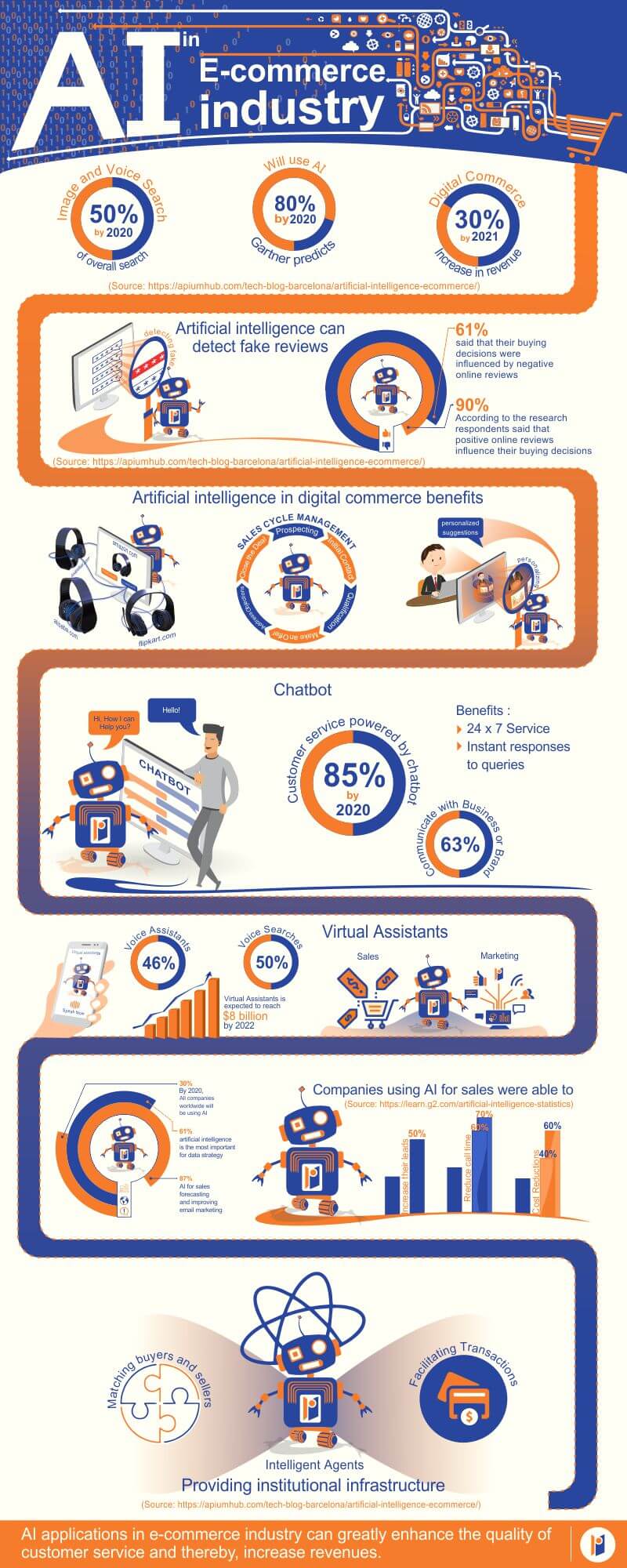In an era of technological advancement, the integration of Artificial Intelligence (AI) in various business sectors is redefining operational norms. The e-commerce industry, in particular, is witnessing a paradigm shift, with AI enabling enhanced efficiency and personalized customer engagement. Let’s get deep dive on how AI is driving remarkable transformation in the world of e-commerce.
#1 Personalization and Customization: The New Norm in E-commerce
In an industry characterized by a sea of competitors, personalization and customization have emerged as potent tools for distinguishing oneself. AI, with its machine learning capabilities and sophisticated algorithms, is instrumental in providing these tailored experiences.
AI systems analyze a consumer’s online behaviour, previous purchases, and browsing patterns. They process this enormous data to understand customer preferences, tastes, and shopping habits. Consequently, e-commerce platforms are empowered to offer individualized product recommendations and customized content tailored to each customer’s interests.
ADVERTISEMENT
Such personalization significantly increases the chances of conversion and fosters a loyal customer base. As we move forward, AI’s role in creating personalized shopping experiences is poised to become even more central, leading the way for a new era in e-commerce.
#2 AI-Driven Customer Service: The Future is Here
The realm of customer service in e-commerce is undergoing a major overhaul, thanks to AI. AI-powered chatbots and virtual assistants are emerging as the cornerstone of a new customer service strategy.
Capable of responding to queries, troubleshooting problems, and offering product suggestions, these AI-powered tools are available round-the-clock. They can manage multiple customer interactions simultaneously, providing an efficient and cost-effective way to maintain customer satisfaction and promote loyalty.
ADVERTISEMENT
In addition, the ability of these AI systems to learn from customer interactions allows them to continually improve their service. This continuous learning capability paves the way for an era of unparalleled customer service in e-commerce.
#3 Harnessing Predictive Analytics for Operational Excellence
AI’s predictive analytics capabilities are allowing e-commerce businesses to forecast trends, decipher consumer behaviors, and identify potential supply chain bottlenecks. These forecasts empower businesses to proactively respond to market dynamics, offering a distinct competitive advantage.
By processing and analyzing vast volumes of data, AI can predict which products will see increased demand in the future. This enables e-commerce platforms to manage their inventory efficiently, preventing overstocking and stockouts, thus reducing costs and improving customer satisfaction.
ADVERTISEMENT
#4 The Advent of Image and Voice Recognition
The introduction of AI technologies like image and voice recognition is ushering in novel shopping experiences. Image recognition technology enables users to upload a picture of a product they’re interested in, and the AI-powered e-commerce platform will display similar or related products available for purchase.
Similarly, voice recognition technology allows users to use voice commands to shop online. This hands-free shopping experience adds another layer of convenience, making e-commerce even more user-friendly. These technologies not only enhance customer experience but also make e-commerce accessible to a wider audience.
#5 Securing E-commerce Transactions with AI
One of the primary concerns with online transactions is the risk of fraud. However, AI is significantly mitigating this concern with its advanced fraud detection capabilities.
By analyzing transaction patterns and identifying anomalies, AI can flag suspicious activities, thereby protecting against potential fraud. This enhances the security of online transactions, increasing consumer trust in online shopping platforms and saving businesses from substantial financial losses.
#6 Streamlining Logistics and Supply Chain with AI

AI is making a significant impact in improving logistics and supply chain management, two vital aspects of e-commerce. AI can optimize delivery routes for products, improve warehouse management, and even predict potential disruptions in the supply chain.
In addition, AI’s ability to automate order fulfillment processes increases efficiency and minimizes the scope for human errors. These enhancements in supply chain management lead to faster delivery times, increased customer satisfaction, and reduced operational costs.
#7 AI in Price Optimization
Pricing strategy plays a pivotal role in the e-commerce landscape. It significantly influences consumers’ buying decisions and the overall competitiveness of the business. AI, with its ability to analyze a vast amount of data, can predict optimal pricing points based on various factors such as demand, competition, and customer purchasing power. This enables businesses to offer competitive pricing while maximizing their profit margins.
#8 AI-Driven Marketing Strategies
Marketing in the e-commerce industry is another area being transformed by AI. Using customer data, AI can identify trends and patterns that human analysis might miss. It helps businesses understand which marketing strategies work best for different customer segments, making it possible to target customers with personalized marketing messages that resonate with them.
Moreover, AI can automate many marketing activities such as email campaigns, social media posts, and content creation, freeing up time for businesses to focus on strategic planning and customer engagement.
#9 AI and User Experience
A well-designed user experience is key to retaining customers and encouraging repeat purchases in the e-commerce sector. AI aids in enhancing the user experience by providing personalized product recommendations, simplifying search functionality, and predicting customer needs even before they realize them.
AI-powered search functions use natural language processing (NLP) to understand customer queries in the same way a human would. This leads to more accurate search results and a better shopping experience for users.
In Conclusion: The Future of E-commerce is AI
There’s no denying that AI is reshaping the e-commerce landscape in unprecedented ways. Whether it’s improving customer service, optimizing logistics, enhancing user experience, or securing online transactions, the influence of AI is pervasive.
As AI technology continues to advance, the future of e-commerce looks set for even more sophistication and personalization. Businesses that understand and leverage the power of AI are likely to excel in this highly competitive market.
The potential of AI in e-commerce is vast, and it’s not a matter of if businesses will adopt AI—it’s about when and how extensively they do so. In the ever-evolving world of e-commerce, leveraging AI is no longer a luxury; it’s a necessity for survival and growth.








